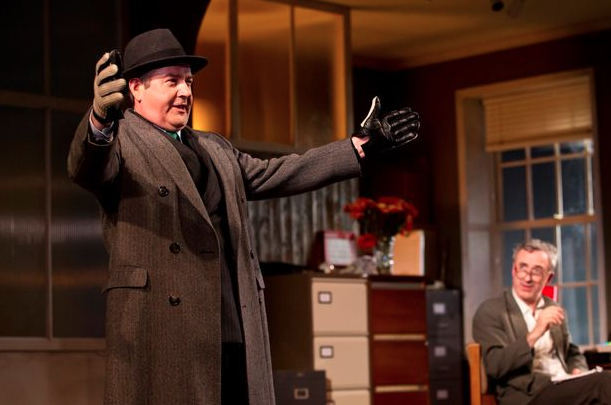
Tom Murphy’s The Gigli Concert, which has returned for a limited run to the Gate Theatre in a production directed by David Grindley, is a deeply interesting experience. While it would be incorrect to say that I enjoyed every part of the almost three hour long performance, I was certainly engaged by it throughout. Murphy’s work has the characteristic appearance of naturalism which, on closer inspection, is merely a thin veneer disguising something closer to magic realism, or even, surrealism. Grindley’s production, in this respect, does Murphy somewhat of a disservice in its largely naturalistic presentation. The script seems somewhat constrained by the production’s stifling faithfulness to reality and as such never quite soars as it possibly could.
Credit must undoubtedly be awarded to Declan Conlon and Denis Conway who succeed in what must be two of the most challenging roles in the entire Irish canon. The mammoth shifts in emotion demanded of both actors (who are onstage for almost the entirety of the performance) certainly makes for impressive theatre, and although I felt Conway’s portrayal of an unhinged property developer to be disjointed, it did nothing to impair my appreciation of his extremely competent performance. My problem with Conway was that for the first half hour he acted almost exclusively with his jaw, a fact which made his later development into a highly complex manipulator difficult to reconcile with his earlier stage-Irish performance.
The Gigli Concert concerns “dynamologist” (akin to Scientologist) J.P.W. King, played by a flawless Declan Conlon, as he attempts to teach Conway’s character to sing like the great tenor Beniamino Gigli. From that rather bizarre, but essentially simple, premise spins conversations ranging from love to death to cosmic structure. At times there is, possibly, too much going on in a conversation, but that may in fact be Murphy’s desire. Attempting to keep up with the wild swings in emotion and tone are what make this piece so engaging and what make the performances of the central characters so virtuosic. It is a pity then that Mona, played by Dawn Bradfield who rounds out the cast, is such a disappointing addition. Bradfield delivers a stellar performance but, unfortunately, she cannot rescue an underwritten character overburdened as a plot device for Conlon’s character.
As I have mentioned, I feel Jonathan Fensom’s set misses out on the potential for experimentation offered by so eclectic a piece. The interior of King’s office is impressive in it’s rigid attention to detail, but is too mundane to enhance the moments of epic climax which regularly occur, and so busy that is occasionally distracts from the performances. Sinéad McKenna’s lighting design is, predictably, wonderful, particularly so when it bursts into the surreal at the conclusion of the piece.
The absent fourth character in this play, Gigli himself, feels present throughout thanks to Gregory Clarke’s sound design. The arias that begin as interruptions to the text soon begin to become an integral part of it, allowing for several displays of masterful synchronicity (one of which earned an ovation). The Gigli Concert is one of the most intellectually demanding productions to have run in Dublin for quite some time and is worth seeing for that fact alone.






